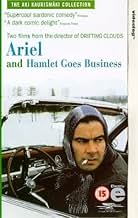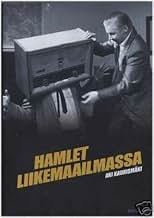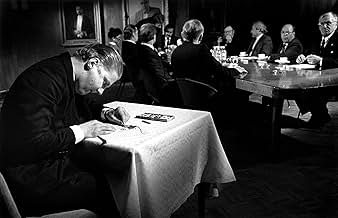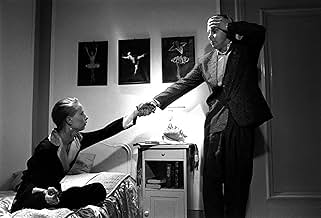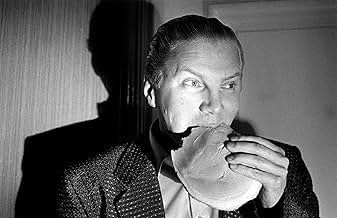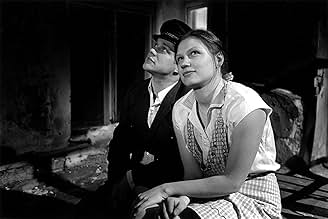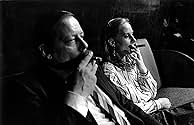Una extraña reelaboración en blanco y negro de 'Hamlet' de Shakespeare. Tras la muerte de su padre, el joven Hamlet hereda un puesto en el directorio de una empresa controlada por su tío.Una extraña reelaboración en blanco y negro de 'Hamlet' de Shakespeare. Tras la muerte de su padre, el joven Hamlet hereda un puesto en el directorio de una empresa controlada por su tío.Una extraña reelaboración en blanco y negro de 'Hamlet' de Shakespeare. Tras la muerte de su padre, el joven Hamlet hereda un puesto en el directorio de una empresa controlada por su tío.
- Dirección
- Guión
- Reparto principal
- Premios
- 1 premio en total
- Simo
- (as Hannu Valtonen)
Reseñas destacadas
Actually, it's more of a black comedy, similarly to Calamari Union (coincidentally, or maybe not, both films were shot in black and white), Kaurismäki's satire on Finnish lowlife. This time, the target is the big industry, within which Hamlet (Pirkka-Pekka Petelius, who also played one of the Franks in Calamari Union) is raised a spoiled brat, spending his days doing mostly nothing, bar flirt with Ofelia (Kati Outinen), whose father (Esko Nikkari) is an important business associate of Hamlet's dad. Then suddenly the situation changes, as the old man is found dead and his brother, Klaus (Esko Salminen) takes over everything, including the marital duties with Hamlet's mother (Elina Salo). Our grief-struck hero is subsequently forced into action after discovering Klaus isn't that innocent: he poisoned his own brother. Hence the inevitable questions: what should Hamlet do? Leave the murderer alone or avenge his father's assassination? In short, to be or not to be?
Ironically, we never hear the protagonist say those words, or the rest of the soliloquy, for that matter. Kaurismäki cut the entire speech because according to him it was ridiculous, useless and distracting, a waste of time: Hamlet would be too busy to start reflecting on life's meaning.
Apart from that (and a few tweaks at the end), Hamlet Goes Business follows Shakespeare's text very closely, albeit with the satirical tone. In fact, the movie's sole weakness is the fact that it gets a little too overblown and surreal come the conclusion, with set-pieces that are funny, yes, but slightly inappropriate in this kind of film.
That said, the film is worth a viewing, if you're open-minded enough. If not, stick with Laurence Olivier or Kenneth Branagh: at least you'll get to hear the famous soliloquy.
It has become notorious for being somewhat flippant about it's source material (Shakespeare's Hamlet).
Actually, I don't remember finding this very humorous at all. In fact, a darker version of the Hamlet narrative could hardly be imagined.
This film represents an important historical turning point; although theatrical directors had been toying with the notion of "updating" Shakespeare, ever since Orson Welles produced a Broadway version of Macbeth with African Americans in the cast back in the late 1930s (When he made his own film version of MacBeth, he chickened out on this, unfortunately). But if the reader has seen the updated version of Romeo and Juliet out of Australia, or the Ethan Hawke Hamlet of 2000, or the recent "O" version of Othello (at last with black actors playing black roles, after all these centuries, for heaven's sake!), it all starts here.
Unfortunately, as I say, this film is so incredibly dark, you'll want to know why Hamlet didn't just cut his throat - "To be, or not to be - oh, the hell with it!" Not for every taste, to say the least.
The basic story of the film retains the set-up and characters familiar from Shakespeare's adaptation, though with a number of separate abstractions beyond those presented by the general updating of the characters and text. For example, rather than being the noble prince, Kaurismäki's Hamlet is a spoilt, oafish brat; more likely to be getting a hankering for a midnight feast and failing to score with his girlfriend Ofelia than prospering in the cut-throat world of business. In our introduction to the character, a nonplussed Hamlet literally stumbles across the body of his murdered father whilst precociously munching on a large slice of ham. Later in the film, as his step-father and mother conspire to take control of the business, a childlike Hamlet is placated in the boardroom by the addition of his own table with colouring books and felt-tip pens. As a work of satire, both on the idea of industry and on the nuts-and-bolts of Shakespeare's text, Kaurismäki is merciless. However, the film also impresses on a purely stylistic level; with the director adapting certain visual quirks and techniques familiar from post war B-cinema alongside his usual stylistic preoccupations to create one of the greatest pop-cinema pastiches since Godard's Pierrot le fou (1965).
As ever with the films of Kaurismäki, Hamlet works as a result of the perfect casting, with a fantastic performance from lead actor Pirkka-Pekka Petelius complimenting Kaurismäki's regular troop of supporting actors, here including Esko Salminen, Kati Outinen, Esko Nikkari, Turo Pajala and Matti Pellonpää. Petelius's Hamlet maintains that typically straight-faced approach shared by many of Kaurismäki's iconic characters, whilst also possessing something of a childlike innocence to set-up the mechanics for that blistering final act. I can certainly see why some viewers would find the more freely adapted elements of the film offensive on a historical level - with Hamlet here recast as a sulky teen bumbling into a conspiracy that he doesn't quite comprehend - but I think it's important to look beyond the presentation of the character found in the more recognisable elements of the Shakespearean piece to see the bold and imaginative use of satire and stark sense of humour that Kaurismäki brings to the project.
The final act of the film is incredibly funny and filled with imaginative and inventive elements that demonstrate what a fantastic and highly original filmmaker Kaurismäki is; with a film like Hamlet Goes Business, not to mention subsequent highlights like Ariel (1988), I Hired a Contract Killer (1991) and The Man Without a Past (2002) showing the range and talent of a sadly underrated artist very much the equal to the more widely acclaimed likes of Tarantino and the Coen Brothers. Here, Kaurismäki's film takes the pop references and retrogressive elements of the former and mixes it with the intelligence and humour of the latter to produce an exceptional film that is unique to his particular style and approach. Although the humour might prove to be a little too dry, or the style too eccentric to appeal to those with a broader cinematic taste, Hamlet Goes Business is really an absolute joy that is worth experiencing. A bold, irreverent, imaginative and impeccably acted satire, with great black and white cinematography, a jarring style and a great central performance from Petelius.
¿Sabías que...?
- CuriosidadesThe script was written in a very loose form and according to Aki Kaurismäki he only read Hamlet on the very week he wrote the script just a couple of weeks before filming.
- Citas
Gertrud: [Hamlet is discussing with his mother] What I am going to say now is not just a whim. You'll understand if you just want to. I loved your father as much as you can demand a good wife to love a tyrant who never returns love, giving you as much passion as he gives to the winter tires of his car.
Hamlet: I ask you not to tarnish my father's memory.
Gertrud: I've been silent too long to gloss over the facts.
Gertrud: Then get to the point.
Gertrud: I'm going to marry Klaus. I love him.
- ConexionesEdited from Melrose: Rich Little Bitch (1987)
- Banda sonoraSymphony No. 11 in G minor, Op. 103
Composed by Dmitri Shostakovich
Selecciones populares
Detalles
- Fecha de lanzamiento
- País de origen
- Idioma
- Títulos en diferentes países
- Hamlet Goes Business
- Localizaciones del rodaje
- Abrahaminkatu 1-5, Helsinki, Finlandia(former University of Technology)
- Empresa productora
- Ver más compañías en los créditos en IMDbPro
- Duración1 hora 29 minutos
- Color
- Mezcla de sonido
- Relación de aspecto
- 1.85 : 1
Contribuir a esta página


